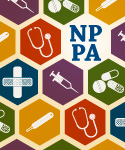May 4th, 2016
The Fringe: Part 2 – Debt Management
Bianca Belcher, MPH, PA-C
So many students come out of medical school, PA school, or nursing school with a significant amount of debt. Couple graduate loans with undergraduate loans and/or other loans that you may have taken on over the years (car, house, etc.) — and the final number can be scary.
I had the opportunity to sit down with a financial expert, Keith Gilbreath from the Highland Financial Group, who specializes in financial management for medical professionals and he was able to present five very relevant tips to help with debt management.
TIP #1: Organize your student loans by interest rate. Focus on paying off the highest interest rate loans first.
| Who You Owe | Loan Amount | Interest Rate | Monthly Payment | Ranking |
| Lender A | 25,000 | 5.25% | $200 | 2 |
| Lender B | 20,000 | 3.50% | $150 | 4 |
| Lender C | 22,000 | 5% | $165 | 3 |
| Lender D | 15,000 | 7.90% | $125 | 1 |
Sit down and list out all of your loans, their amounts, interest rates, and monthly payments. Add a final column entitled Ranking. Run-through all of your loans and rank them according to interest rate (Highest = 1). Focus on paying off your highest interest rate loans first. According to the example above you would focus on paying off Lender D first. So, in addition to the monthly payment, you should try to pay extra per month just toward that loan as opposed to the group of loans. Once you pay it off, you then can take that $125 per month payment (that you are used to paying already) and add it as an “extra” payment for Lender A (Rank #2) and so on and so forth.
TIP #2: Consider Consolidation. When possible, a simplified payment to a singular entity (at a low interest rate) always trumps multiple payments to a bevy of providers. New private providers (big banks) focus on debt repayment every few months. Keep an eye out for great interest rates and consolidation deals, even if it is just for the highest interest rate debt that you have. If you qualify, it could save you thousands in the long run!
TIP #3: Pace Yourself. Although paying off loans is very important, don’t forget about the other things in your financial life that need attention – like retirement!
TIP #4: Create Automatic Payments. Debt and revolving credit often carry penalties for late or missed payments. Set yourself up for success by scheduling automatic payments and chip away at those balances worry free. In addition, some lenders even offer a reduction in interest rates if you sign up for automatic payments.
TIP #5: Review you balance(s) periodically. Everyone likes success and while you may groan at the sight of your remaining balance, remember: 1) where you started, and, 2) that you are headed in the right direction! Progress should always be celebrated.
In the upcoming part 3 of “The Fringe” series, we will discuss deciphering your benefits package.

; [/php]/images/AU000_bbelcher.jpg)
